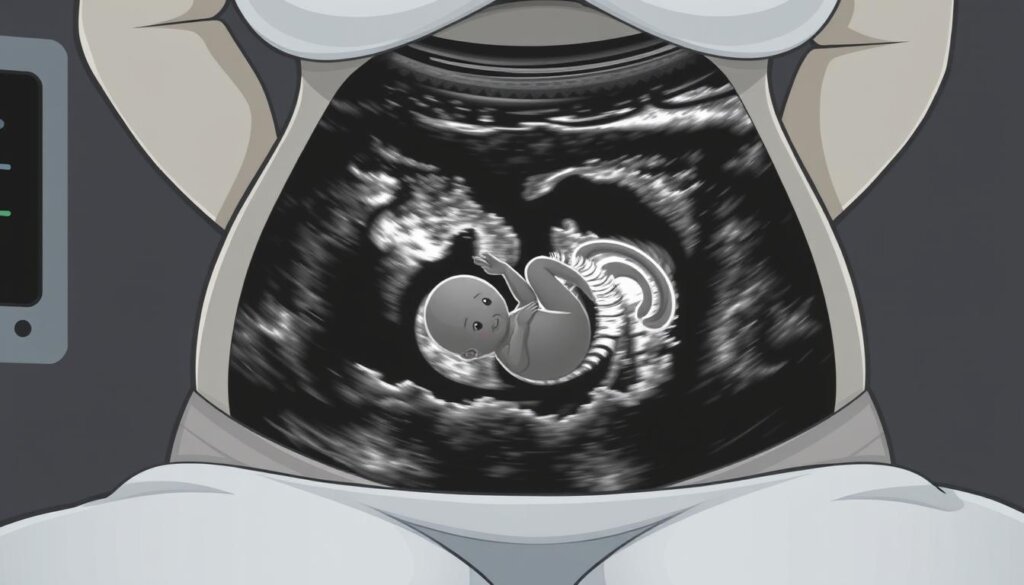FTC disclaimer: This post may contains affiliate links and we will be compensated if you click on a link and make a purchase.
Imagine a pregnancy that’s different from the usual. The fertilized egg implants outside the uterus, in the belly. This rare condition is called an abdominal pregnancy. It’s an emergency in pregnancy, happening in just 1 in 10,000 to 30,000 cases.
Even though it’s rare, it can be very dangerous. The risk of the mother dying is as high as 20%. Understanding its symptoms, how to diagnose it, and how to treat it is key. This helps ensure the best outcome for both the mom and the baby.
Key Takeaways
- Abdominal pregnancy is a rare form of ectopic pregnancy that occurs when the fertilized egg implants outside the uterus, in the abdominal cavity.
- It accounts for about 9.2 cases per 1,000 ectopic pregnancies and has an incidence of approximately 10.9 per 100,000 live births.
- Abdominal pregnancies are declining in number due to increased awareness and improved care, but the incidence is still higher (19%) in non-industrialized countries.
- Symptoms can include persistent abdominal pain, gastrointestinal issues, and abnormal fetal movements, and physical findings may include abdominal tenderness and a displaced uterine cervix.
- Accurate diagnosis through ultrasound, MRI, and blood tests is crucial for effective management and to reduce the risk of severe complications, such as uncontrollable hemorrhage and maternal death.
What is an Abdominal Pregnancy?
Definition and Prevalence
An abdominal pregnancy is a rare and dangerous form of ectopic pregnancy. It happens when a fertilized egg implants outside the uterus, in the abdominal cavity. The egg can implant in places like the reproductive organs, uterine serosa, omentum, bowel, and mesentery.
Abdominal pregnancies make up about 1% of all ectopic pregnancies. They occur in 1 in 10,000 to 30,000 pregnancies.
Even though it’s rare, abdominal pregnancy is very dangerous for both the mother and the baby. Finding and treating it early can help, as it’s often hard to diagnose. It’s key to remember that other types of ectopic pregnancies, like tubal and ovarian, have their own discussions.
Always talk to a healthcare provider for all your health questions and treatment options.

“Abdominal pregnancy is a rare and dangerous form of ectopic pregnancy, with high maternal and fetal morbidity and mortality. Early recognition and treatment are crucial for improving outcomes.”
Causes and Risk Factors
Abdominal pregnancies are rare but can be very dangerous. They happen in about 1% of all ectopic pregnancies. This is much less common than tubal ectopic pregnancies, which are more common.
The exact reasons for abdominal pregnancies are not fully known. But, there are known risk factors that can lead to them.
Having had a previous ectopic pregnancy is a big risk factor. Women who have had an ectopic pregnancy before are more likely to have another one, including an abdominal pregnancy. Other risks include tubal surgeries or damage, endometriosis, and pelvic inflammatory disease. These can cause scarring and changes in the reproductive organs, making ectopic implantation more likely.
In some cases, there’s no known risk factor. Abdominal pregnancies can happen without any known reason. Early diagnosis and treatment are key because of the serious risks, like bleeding inside the belly.
Risk Factor | Description |
|---|---|
Previous Ectopic Pregnancy | Women with a history of ectopic pregnancy, especially in the fallopian tube, have an increased risk of experiencing another ectopic implantation, including an abdominal pregnancy. |
Tubal Surgery or Damage | Conditions like tubal ligation, previous tubal rupture, or other tubal damage can lead to structural changes that make ectopic implantation more likely. |
Endometriosis | This chronic condition, characterized by the growth of uterine lining outside the uterus, can contribute to scarring and increase the risk of ectopic pregnancy. |
Pelvic Inflammatory Disease | Infections that cause inflammation and scarring in the pelvic region, such as sexually transmitted infections, can also increase the likelihood of ectopic implantation. |

While these risk factors are important, it’s key to remember that abdominal pregnancies can happen without known causes. Being careful with diagnosis and quick medical help are crucial. This is because of the serious risks linked to this rare condition.
Symptoms of Abdominal Pregnancy
A woman with an abdominal pregnancy might feel like she’s pregnant normally at first. She might notice missed period, nausea, vomiting, breast tenderness, and fatigue. But she could also feel abdominal pain and/or vaginal bleeding, which means she needs to see a doctor right away.
As the pregnancy gets bigger, she might feel painful fetal movements. This is because the fetus isn’t safe inside the uterus and amniotic sac.
Early and Late Signs
At first, it’s hard to tell if a pregnancy is abdominal or normal. In some places, about half the cases of abdominal pregnancy are missed at first. But as the pregnancy goes on, the symptoms get worse. The woman will feel more abdominal pain and discomfort.
It’s very important to know that abdominal pregnancies are high-risk. They can cause serious problems for both the mom and the baby. Getting medical help fast is key to a good outcome.
“Abdominal pregnancies are dangerous for both the mother and the fetus due to risks such as heavy internal bleeding and inadequate nutrients for the fetus.”

Diagnostic Methods
Ultrasound, MRI, and Blood Tests
Finding an abdominal pregnancy can be hard. It looks like a tubal ectopic pregnancy at first. Ultrasound is key to see the baby’s sac outside the uterus. If it’s not clear, MRI helps more.
Blood tests for beta-human chorionic gonadotropin (beta-hCG) also help. High beta-hCG levels might mean an ectopic pregnancy, like an abdominal one. About 39% of women with pain and bleeding might have an ectopic pregnancy.
Diagnostic Method | Description |
|---|---|
Ultrasound | The primary tool used to confirm the location of the gestational sac outside the uterus. |
MRI | Can be helpful in cases where the ultrasound findings are inconclusive. |
Beta-hCG Blood Test | Disproportionately high levels compared to the stage of pregnancy can indicate an ectopic pregnancy. |

It’s very important to find an abdominal pregnancy right and fast. An advanced abdominal pregnancy makes things harder. These pregnancies have been found all over since 1708. They are usually found late in pregnancy.
Abdominal Pregnancy Complications
Risks to the Mother and Fetus
Abdominal pregnancies are risky for both mom and baby. The main worry is the high chance of serious health problems for the mom. This is because of the risk of severe bleeding if the placenta detaches.
The baby faces dangers too. They might not get enough blood and nutrients. They also lack the protection of the uterus and amniotic sac. Babies who survive often have birth defects because of this.
Abdominal pregnancies are rare, happening in about 1 in 10,000 births. They make up 1.4% of ectopic pregnancies. They are the only type of ectopic pregnancy that can go beyond 20 weeks.
It’s hard to diagnose abdominal pregnancy because symptoms are vague. Doctors use ultrasound to look for signs like an empty uterus and unusual fetal position.
Abdominal pregnancy can be very dangerous. It can lead to serious bleeding, which is life-threatening for both mom and baby. Doctors might use surgery, like laparoscopy, to manage it.
When doctors do surgery, they have to be very careful. Removing the placenta can cause a lot of bleeding. They only do this if it’s safe.
“The removal of the placenta in abdominal pregnancy can cause torrential bleeding and maternal death, warranting cautious decision-making during surgical procedures.”
Management of Early Abdominal Pregnancy
When an abdominal pregnancy is found early, surgical management is often the first choice. Laparoscopic surgery is preferred if it can be done without too much bleeding. If it might bleed a lot, doctors might use methotrexate instead.
Many studies have looked into advanced extrauterine pregnancies. They show how hard it is to diagnose and treat them. There have been cases of ectopic pregnancies in the appendix and even in the liver.
Doctors have used imaging to check for splenic pregnancies. This shows how important imaging is in finding these rare cases. There’s still a lot of research going on in this area.
“Uncommon presentations of abdominal pregnancies, like missed abortions or unusual symptoms, have been detailed in medical journals.”
There have been cases of full-term pregnancies outside the uterus. This helps doctors understand these rare events. A case from Nigeria shows how common this can be worldwide.
There have been live births from advanced abdominal pregnancies. This shows that sometimes, these pregnancies can end well. A review from 2008 to 2013 showed more live births from these pregnancies.
Doctors have looked at 163 cases of advanced abdominal pregnancies. This gives a big picture of the condition. Studies have found many things that can increase the risk of ectopic pregnancies.
Imaging like MRI and ultrasound are key in diagnosing and treating abdominal pregnancies. There have been successful laparoscopic treatments. This shows how good doctors are getting at treating these pregnancies.
Abdominal ectopic pregnancies happen in about 9–11 per 1000 ectopic pregnancies. The death rate is between 0.5% and 20%. Some states have laws that ban abortions after 20 weeks unless the mother’s health is at risk. A woman had to travel over 500 miles for an abortion because of these laws. She felt sad and judged by her local doctors for choosing to end the pregnancy.
In conclusion, managing early abdominal pregnancy is a big decision. It depends on the situation of each patient. More research and experience help doctors give the best care for these complex cases.
Treatment for Advanced Abdominal Pregnancy
Advanced abdominal pregnancies often need surgery. A laparotomy is usually the best option. The surgeon must be very careful to avoid heavy bleeding.
In some cases, the placenta is left in and treated with methotrexate. This helps it to break down slowly. This method can lower the risk of big bleeding.
A team of experts is often needed for these complex surgeries. They include vascular surgeons, trauma surgeons, urologists, and gynecological oncologists. This team works together to get the best results.
Surgical and Medical Options
- Laparotomy: A surgical procedure to access and remove the fetus and placenta.
- Placental Removal: In some cases, the placenta may be left in place and treated with methotrexate to allow for gradual reabsorption.
- Multidisciplinary Surgical Team: Specialists from various fields may be required to manage complex late-stage abdominal pregnancy cases.
The main goal is to safely deliver the baby and remove the placenta. This helps avoid serious problems for the mother. With the right care and a skilled team, good outcomes are possible.
“The management of advanced abdominal pregnancy requires a meticulous surgical approach to mitigate the risk of severe hemorrhage and other life-threatening complications.”
Abdominal Pregnancy vs. Tubal Ectopic Pregnancy
Abdominal and tubal ectopic pregnancies happen outside the uterus but are different. Tubal ectopic pregnancies are common, making up over 95% of cases. Abdominal pregnancies, however, are rare, making up only about 1.4% of ectopic pregnancies.
Abdominal pregnancies are much riskier for the mother. The risk of death is about 5 per 1,000 cases, much higher than other ectopic pregnancies. This is because of the risk of severe bleeding from where the placenta implants.
Abdominal pregnancy is very rare, happening in about 1 in 8,000 pregnancies. By 2007, only 24 cases of primary abdominal pregnancies were reported. In contrast, ectopic pregnancies can also implant in other rare places, like the fallopian tube, cervix, or ovary.
Both types of ectopic pregnancies start with similar symptoms like missing periods, pain, and bleeding. But, the risks and how they are treated are different. Abdominal pregnancies need more complex treatments to keep the mother and baby safe, if the baby is alive.
Characteristic | Tubal Ectopic Pregnancy | Abdominal Pregnancy |
|---|---|---|
Prevalence | Most common ectopic pregnancy (>95%) | Rare (1.4% of ectopic pregnancies) |
Maternal Mortality | Lower (3-4% of pregnancy-related deaths) | Higher (around 5 per 1,000 cases) |
Fetal Outcomes | Poor, but better than abdominal pregnancy | Very poor (40-95% perinatal mortality) |
Treatment | Often medical (methotrexate) or surgical (salpingectomy) | Surgical, more complex |
In summary, both types of ectopic pregnancies are dangerous. But, abdominal pregnancies are much riskier for both the mother and the baby. Quick diagnosis and proper treatment are key to better outcomes in these cases.
Prognosis and Follow-up Care
Abdominal pregnancies are very dangerous for mothers. They can lead to up to 7.7 times more deaths than other ectopic pregnancies. And up to 90 times more than pregnancies inside the uterus. Even with good treatment, mothers can still face serious problems like bleeding and infections.
It’s very important to watch them closely and follow up well. This helps catch and treat any problems early.
Ectopic pregnancy, including abdominal pregnancy, is a big cause of death in pregnancy in the U.S. It’s responsible for 2.7% of pregnancy-related deaths from 2011 to 2013. Abdominal pregnancies are rare, making up about 0.6–4% of all ectopic pregnancies. But they are very dangerous for both the mother and the baby.
Quick diagnosis and treatment are key to better outcomes. But, diagnosing abdominal pregnancy early is hard. This makes it even more dangerous.
Early treatment can help lower risks. It can also improve chances of a good outcome for both the mother and the baby.
Women who have had an abdominal pregnancy need careful follow-up. Doctors must watch for signs of problems like bleeding or infection. They need to act fast to help the mother and baby.
In summary, abdominal pregnancies are very risky for mothers. They can lead to serious problems after surgery. Close monitoring and good follow-up care are key. They help improve the chances of a good outcome for women with this rare and dangerous pregnancy.
Complication | Risk |
|---|---|
Maternal Mortality | Up to 7.7 times higher than other ectopic pregnancies and 90 times higher than intrauterine pregnancies |
Postoperative Hemorrhage | Increased risk for women who have had an abdominal pregnancy |
Postoperative Infection | Increased risk for women who have had an abdominal pregnancy |
Preventing Abdominal Pregnancy
There’s no sure way to stop abdominal pregnancy for good. But, we can lower the risk by tackling known risk factors. These include past ectopic pregnancy, tubal surgery or damage, pelvic inflammatory disease, and endometriosis. Treating these issues early and fixing fertility problems can help a lot.
When risk factors are there, watching closely and acting fast is key. Regular prenatal visits, quick diagnosis, and right care are vital. They help keep mom and baby safe. Healthcare teams can really help avoid the bad effects of abdominal pregnancy.
Risk Factor | Description |
|---|---|
Previous Ectopic Pregnancy | Women with a history of ectopic pregnancy, including tubal or abdominal pregnancy, have a higher risk of experiencing another ectopic pregnancy. |
Tubal Damage or Surgery | Damage to the fallopian tubes, often due to pelvic inflammatory disease or previous tubal surgery, can increase the likelihood of an ectopic pregnancy. |
Pelvic Inflammatory Disease (PID) | PID, an infection of the female reproductive organs, can lead to scarring and damage to the fallopian tubes, increasing the risk of ectopic pregnancy. |
Endometriosis | This condition, where the uterine lining grows outside the uterus, has been associated with an increased risk of ectopic pregnancy. |
By tackling these risk factors, we can all work to lower the chance of abdominal pregnancy. This ensures the best for mom and baby.
“Preventing abdominal pregnancy requires a multifaceted approach, focusing on early detection, prompt management of underlying conditions, and close monitoring of high-risk pregnancies.”
Conclusion
Abdominal pregnancy is rare and very dangerous. It needs quick diagnosis and the right treatment to lower the risk of death for the mother and harm to the baby. The first signs can look like other ectopic, but doctors must be very careful. They use tools like ultrasound and MRI to find it early.
Treatment can be surgery or medicine, based on how far along the pregnancy is and the situation.
Secondary abdominal pregnancy is very rare, happening in 1 in 10,000 live births. Advanced cases are even rarer, found in 1 in 25,000 pregnancies. The risk of the mother dying can be between 0.5% and 8%. The baby’s chance of survival is also low, between 40% and 95%.
Doctors usually recommend surgery right away when they find an abdominal pregnancy. This is because it can lead to serious problems.
It’s important to keep watching the mother and baby closely after treatment. This helps deal with any problems that might come up. The case study shows how important it is to be careful and diagnose early for the best care.
FAQ
What is an abdominal pregnancy?
Abdominal pregnancy is a rare type of ectopic pregnancy. It happens when a fertilized egg implants outside the uterus, in the belly. It can attach to organs like the reproductive organs or the bowel.
How common are abdominal pregnancies?
Abdominal pregnancies are rare, making up about 1% of all ectopic pregnancies. They happen in 1 in 10,000 to 30,000 pregnancies.
What are the risk factors for abdominal pregnancy?
Certain conditions increase the risk. These include previous ectopic pregnancy, tubal surgeries, endometriosis, and pelvic inflammatory disease. These can damage the fallopian tubes, making ectopic implantation more likely.
What are the symptoms of an abdominal pregnancy?
Symptoms can be similar to a normal pregnancy at first. You might miss your period, feel nauseous, or have breast tenderness. But, you could also have abdominal pain or vaginal bleeding, which are signs to see a doctor right away. As the pregnancy grows, you might feel pain when the baby moves.
How is an abdominal pregnancy diagnosed?
Ultrasound is key for diagnosis. It shows the gestational sac outside the uterus. If the ultrasound is unclear, an MRI might help. High beta-hCG levels also suggest an ectopic pregnancy, including abdominal ones.
What are the risks associated with abdominal pregnancy?
Abdominal pregnancies are very risky for the mother. They can lead to severe bleeding and even death. The baby faces risks too, like not getting enough blood and nutrients. Babies who survive often have birth defects.
How are early-stage abdominal pregnancies treated?
Early diagnosis means surgery is often the first choice. Laparoscopic surgery is preferred if it’s safe. If it’s too risky, methotrexate might be used instead.
How are advanced abdominal pregnancies treated?
Advanced cases need surgery. A laparotomy is usually done to avoid heavy bleeding. Sometimes, the placenta is left in place and treated with methotrexate to prevent severe bleeding.
How does abdominal pregnancy differ from tubal ectopic pregnancy?
Both happen outside the uterus, but abdominal pregnancies are much riskier. They can cause severe bleeding, unlike tubal ectopic pregnancies.
What is the prognosis for women with abdominal pregnancy?
Abdominal pregnancies are very dangerous for the mother. They can be up to 7.7 times more deadly than other ectopic pregnancies. Even with treatment, there’s still a risk of complications like bleeding and infection.
How can abdominal pregnancy be prevented?
Preventing it is hard, but managing risk factors can help. This includes treating conditions like pelvic inflammatory disease and endometriosis. Also, addressing fertility issues can lower the risk.








